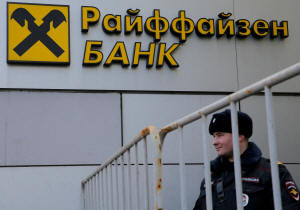Analysis-Loans to Russian soldiers fuel calls for European banks to quit
 Send a link to a friend
Send a link to a friend
 [February 13, 2023] By
John O'Donnell and Simon Jessop [February 13, 2023] By
John O'Donnell and Simon Jessop
BERLIN/LONDON (Reuters) - A Russian scheme to grant loan payment
holidays to troops fighting in Ukraine, and for banks to write off the
entire debt if they are killed or maimed, has added to growing pressure
for the remaining overseas lenders in Russia to leave.
Almost a year since Moscow launched what it calls a "special military
operation" in Ukraine, a handful of European banks, including Austria's
Raiffeisen Bank International and Italy's UniCredit, are still making
money in Russia.
The loan relief scheme has not only triggered criticism from Ukraine's
central bank, which said it had appealed to Raiffeisen and other banks
to stop doing business in Russia, but also from investors concerned
about any reputational impact.
Raiffeisen and UniCredit are both deeply embedded in the Russian
financial system and are the only foreign banks on the central bank's
list of 13 "systemically important credit institutions", underscoring
their importance to Russia's economy, which is grappling with sweeping
Western sanctions.

Their role in supporting the Russian economy at a critical time for
President Vladimir Putin has prompted some investors to go public with
their misgivings.
"Companies should be very careful," said Kiran Aziz, of Norwegian
pension fund KLP, cautioning of a major risk that the banks could be
used to "in other ways finance the war". KLP funds hold shares in both
Raiffeisen and UniCredit.
At the time the payment holiday law was going through parliament in
September, Vyacheslav Volodin, the influential speaker of the lower
house, made clear its importance to Russia.
"Soldiers and officers ensure the security of our country and we must be
sure that they will be taken care of," he said.
Eric Christian Pederson of Nordea Asset Management, which has more than
300 billion euros ($320 billion) under management, said he too was
concerned about Raiffeisen and UniCredit's Russian presence and had
raised this with them.
The requirement that the banks grant payment holidays to soldiers
"illustrates the dangers of operating in jurisdictions where companies
can … be forced into actions that go directly against their corporate
values," he added.
"We feel that it is right for companies to withdraw from Russia, given
its unprovoked attack on Ukraine," said Pederson. Refinitiv data shows
Nordea owns shares in UniCredit.
Banks restructured a total of 167,600 loans for military personnel or
their family members, worth more than 800 million euros, between Sept.
21 and the end of last year, Russian central bank data shows.

Raiffeisen said that only 0.2% of its Russian loans are affected by the
"government-imposed loan moratorium", a sum it described as
"negligible". The bank has a total of almost 9 billion euros of loans in
Russia, where it has been for more than 25 years, including to
companies.
It made a net profit of roughly 3.8 billion euros last year, thanks in
large part to a 2 billion euro plus profit from its Russia business.
UniCredit, which entered the Russian market almost 20 years ago when it
acquired an Austrian bank, said that the rule was "mandatory under the
federal law … for all banks", declining to say how many of its loans had
been forgiven.
The Italian bank added that its business in Russia was focused on
companies rather than individuals. Of UniCredit's more than 20 billion
euro total revenue last year, Russia accounted for more than 1 billion
euros.
But despite an initial sharp fall, UniCredit's shares are now
significantly higher than before Russia moved its troops into Ukraine on
Feb. 24 last year, while Raiffeisen's, with a more limited free float,
have not recovered.
[to top of second column] |

A Russian police officer stands in
front of a branch of the Raiffeisen Bank in Moscow, Russia, February
27, 2016. REUTERS/Maxim Shemetov/File Photo

"Any profiteering on the ongoing war is not acceptable or aligned
with our view of responsible investments," said a spokesperson for
Swedbank Robur, one of Scandinavia's top investors, adding that
reputational risk was a worry.
Swedbank Robur said it has stakes in both banks, but did not
disclose figures.
Larger institutional investors, including France's Amundi and
Norway's sovereign wealth fund, which advocates responsible
investing, declined to comment when asked for their views.
WINDOW CLOSING?
Some foreign banks have made relatively quick exits.
France's Societe Generale severed its Russia ties in May by selling
Rosbank to businessman Vladimir Potanin's Interros Group.
But the continued presence of two of Europe's biggest banks is
attracting the attention of regulators at the European Central Bank
(ECB), one person familiar with the matter said.
Andrea Enria, the ECB's chief supervisor, said the window to quit
was "closing a bit" because Russian authorities were taking a more
"hostile" approach. But he also voiced support for any bank wanting
to reduce their business there or leave.
Raiffeisen and UniCredit confirmed they were in discussions about
Russia with the ECB.
UniCredit said it kept the ECB "fully and regularly up to date on
our strategy of orderly de-risking our exposure to Russia".
But with money still to be made, Raiffeisen saw profit from its
business in Russia more than triple last year.

Meanwhile, Russian savers lodged more than 20 billion euros with the
bank, which offers a place to deposit funds with fewer sanctions
risks.
This means there is no great impetus for banks to leave Russia,
despite regulatory pressure.
And in Austria, which has close historical and economic ties to
eastern Europe and Russia, politicians are largely silent on
Raiffeisen's continuing Russian presence, which in recent months
prompted protests outside its headquarters.
Johann Strobl, Raiffeisen's CEO, has said he is examining options
for the Russian business, although points out that any move is
complicated, having earlier said that the bank is not "a sausage
stand" that could be closed overnight.
For some the question is more about morality than money.
Heinrich Schaller, head of RBI's third largest shareholder
Raiffeisenlandesbank Oberoesterreich and deputy chairman of
Raiffeisen, is among those to have aired doubts about staying.
"Of course it is a question of morals," he said recently. "No doubt
about it."
Whatever shareholders may say, a decree by Putin is likely to make
getting out of Russia difficult. It banned investors from so-called
unfriendly countries from selling shares in banks, unless the
Russian President grants an exemption.
($1 = 0.9376 euros)
(Additional reporting by Alexandra Schwarz-Goerlich in Vienna and
Tom Sims in Frankfurt; Writing by John O'Donnell; Editing by
Alexander Smith)
[© 2023 Thomson Reuters. All rights
reserved.]
This material may not be published,
broadcast, rewritten or redistributed.
Thompson Reuters is solely responsible for this content.
 |